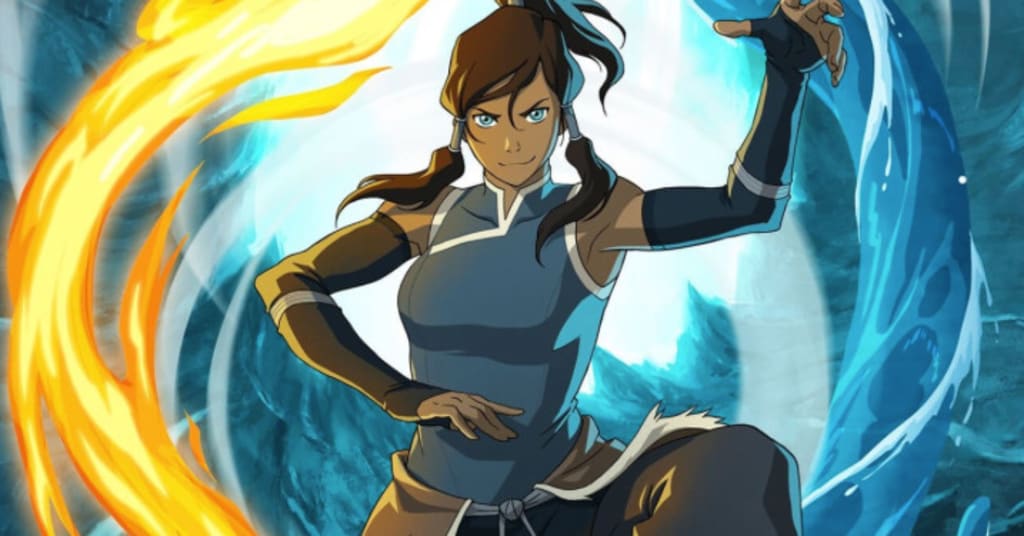
Back in the day, I was in the Legend of Korra (LOK) fandom.
I watched Book One when it came out in 2012 and liked it. I fell off the wagon sometime in mid to late Book Two and took a while before getting back on; I've always been a big believer that add-ons to a canon of something beloved are entirely optional. Even if I thought LOK, at that point, was only okay, nothing could mar my undying love for the original Avatar: The Last Airbender as my favourite show of all time. I missed the long hiatus between seasons and saw the first three episodes of Book Three: Change on Youtube, watching it on a whim on a friend's house.
I was immediately hooked and fell into the fandom, eagerly awaiting every episode of Book Three and then, after a heart-wrenching finale, Book Four. I even got up early before school to watch Book Four: Balance as it aired weekly. I was there for arguably The Legend of Korra's most iconic moment, watching it live. Sometime afterwards, I acquired the other three DVDs for the seasons, and rewatched Book Three and Book Four from time to time.
However, that was back in 2014, with my latest rewatching of anything LOK related perhaps 2015 or 2016 latest. Recently, I rewatched ATLA with friends who hadn't seen it, and afterwards, they asked about watching Korra.
"Sure," I said. "Why not?" I knew the latter two seasons were amazing, in my memory, and I would finally be watching all of Book Two for the first time.
So, about seven years later, here's The Legend of Korra — in retrospect.
Book One: Air
Book One is a mixed bag. On the one hand, the animation has never been better, and some of the advancements in technology and bending are genuinely fascinating. We spend time in only two real cities in the original series (the Northern Water Tribe capitol and Ba Sing Se), so having that be our main stay now is reinvigorating, even if it's a large departure from the questing structure of the original series.
In some ways Republic City reminds me of the Boiling Rock, full of its own criminals and inter-city politics. There are conniving politicians and corruption in the police force that Korra wades largely unknowingly into. The look and feel of the city is also inspired by the development of Chinese cities in the 20th century, although many of the other 20s inspired aspects can come across as very western. (An excellent youtube video here that goes into it better than I ever could.)
The pacing in the first half of the season is a little shaky, mostly because of the Korra/Mako/Asami, Bolin/Korra/Mako love triangles running around, however short-lived some of them are. It leaves the main team feeling discombobulated, if not often divided. However, they do work well as a team, and the combinations of bending with car chases are a highlight.
The pacing solidifies in the second half of the season, with easy real world comparisons and a surprising amount of politics, both to abuse of power and press, as well as terrorist bombings and the like. The episode exploring Amon (Noatak) and Tarrlok's history is easily the best of the season. So too is their final scene together one of the best in the series.
The finale episode and how Amon is taken down, and how Korra's lack of powers, are resolved easily feels anticlimatic, but overall it finishes up the season and the main arcs — the Equalists, airbending, and the Korra/Mako romance — decently well. What Book One leaves me with, particularly with three more followup seasons, is a sense of missed opportunity and potential. This is a consistent issue with LOK as a whole.
We see how Mako was affected by growing up on the streets, but it never seems to affect Bolin wholeheartedly besides making him excited for new or expensive experiences. How does Mako feel about his parents being killed by a firebender (when it could've been literally any other type of bender) while also being a firebender? We never find out. Just as we don't see Asami's dad until early Book Four, two seasons later.
This reflects the show's political follies. Most of the issues we see nonbenders face, like Tarlok's police brutality, is an escalated response to Amon's misdoings - at least as an excuse. We don't see them routinely miss out on jobs or opportunities. If anything, President Raiko's election and disbandment of the bending council all happening in less than six months (as they happen in between the end of Book One and start of Book Two) makes it seem like these issues all could've been generally and easily resolved if not for a few bad corrupt apples in the government.
Overall, Book 1 of Legend of Korra is a solid 7/10. Not amazing and not without its flaws, but a generally good season with some stellar moments and routinely gorgeous animation.
Unfortunately, Book Two cannot quite say the same.
Book Two: Spirits
...is bad. The season simultaneously has too much going on and too little investment in any of it. There are multiple, barely connected subplots, many of which for the other main cast (Mako, Asami, and Bolin) are particularly interesting, although the season's mid-point episode, "The Sting" was actually a highlight with its Mako-and-Asami focus, because at least it was expanding on a previously established relationship and had stakes regarding Asami's company.
The civil war between the Water Tribes, Tenzin's family bickering (for both his siblings and his children), Korra's short-lived tutelage under Tenzin and Unalaq, the Bolin-Eska 'romance,' Varrick's shady business deals and Bolin's mover-star arc, are all crammed in together with very little stakes, cohesion, and inter-relatability. Tenzin and his siblings also argue so much it's hard to like Bumi and Kya, especially when we can see how little respect they held for their Dad's culture (even if they were some of the sole inheritors) and their refusal to recognize the weight on Tenzin's shoulders, even in the fact he's the only one of the three to have children. It's especially hard to take them seriously, seeing as they're close to being in their 60s at this point, and their ire is largely for being left out of family vacations when they would've already been teenagers and Tenzin a young child.
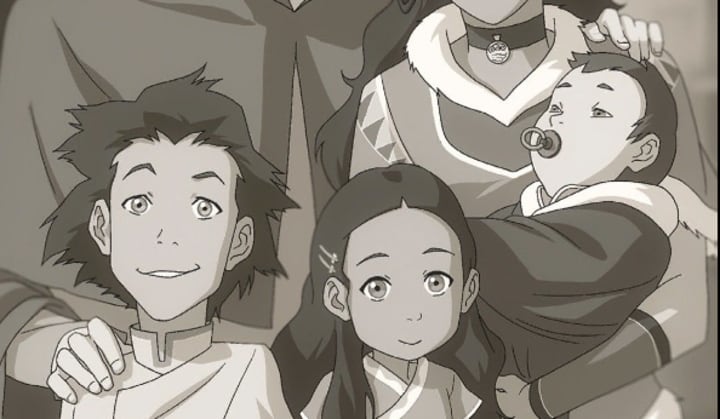
Bumi appears to be close to ten or twelve years old when Tenzin was born, so by the time Tenzin was old enough to travel around anywhere from 6-12 years old himself, Bumi would've been... 16-20 years old, and bummed out on not going to make sandcastles at the beach? Bumi, old enough to enlist, was totally missing out on family vacations because...? In addition to Aang, simply, presumably having periods of his life where his Avatar duties demanded more of him (like possibly more of Kya's childhood, since she seems to be six years older than Tenzin) and less when Tenzin was young. As the youngest child of a set of age gap siblings, it's frustrating to see two grown adults show so little sympathy and understanding and instead just add to the weight of things that Tenzin never asked for. Because maturity is for suckers, apparently.
Furthermore, one of the reasons this season struggles is because it doesn't know what to do, quite frankly, with most of the cast — namely Asami and Bolin — post season one. While this is an issue in half the show except for season one and season three, it's very obvious this season, seen first hand in the finale.Does Asami's company matter in the finale? No—in fact, after leaving early on, Asami isn't in the finale at all.
The finale does have some good parts, though. Korra and Mako break up, get briefly 'back together,' and then break up again in a move that filled my friends and I with relief. This was a surprise to me as well, as I remembered liking them more as a possible ship after they broke up (I'm a sucker for exes to lovers again), but this time there was none of that desire. While I think their relationship is developed better, objectively, than Korra's endgame ship due to just having more screentime and growth over the course of the four seasons, I am now doubly glad that she did not end up with Mako for narrative and personality reasons.
As most people would agree on, the highlight of the season is the music (Jinora's Light is gorgeous and stunning; composer Jeremy Zuckerman knocks it out of the park every time) and the backstory of the first Avatar, Wan, in the two-parter "Beginnings." The animation is gorgeously unique, crafted with care, and the two episodes tell an interesting and compelling origin story in flashbacks of Wan's life and how he bonded with the Light Spirit, Raava.
However, two good episodes out of fourteen (and yes, this is the longest season of Legend of Korra, and by God does it feel like it) cannot salvage a season in which I sat through many subplots wondering where it would go, or action scenes in the finale bored out of my mind. In fact, the saving grace is largely in the set up it provides the best season of LOK, and one of the best seasons of Avatar, in general.
Book Three: Change
Is a breath of fresh air.
It's not an unpopular opinion that Book Three is the best season of Korra or indeed one of the best seasons in the Avatar universe. But why is this season so good? Well, I think it's a combination of a few things:
- The pacing is finally solid. This was the biggest issue in LOK's first season, but they finally get their bearings fully for the first (and last) time in the series. I think the fact that the pacing is solid is because all the stories are more centralized, but I'll talk about that later.
- Everyone has the same congruent goal. This was probably the biggest issue in S1, but in S3, its biggest strength is that for episodes at a time, the main characters are all together and more than that, they are working towards the same goal of finding new airbenders. Not only does this bring back the questing roadtrip vibe that so much of ATLA did, but it also keeps the plot contained from spiralling out into subplots. Even when Tenzin and the airbenders do break away from Team Avatar, there are only ever three plot lines happening at any given time: Korra and friends, the Red Lotus, either the airbenders, or Lin's family drama.
- Korra has matured into an Avatar willing to talk things out and not just hastily jump into things. She and Tenzin are working together, she and Mako are working on being just friends, she and Asami are finally bonding, and everyone feels like a team with her at the helm. Korra being someone we can root for is doubly important this season, as it makes the ending all the more heart wrenching (but more on that later).
- The Red Lotus are great villains. A ghastly inversion parallel to Team Avatar, the Red Lotus boasts unique and interesting possibilities for fight scenes, ideologies, and character interactions. How often do we get villains who work genuinely in groups and aren't just trying to grab power from each other, after all? The Red Lotus have a reasonable presentation, are dangerous, and a compelling set of villains, particularly Zaheer, with a wonderfully creepy vibe (special shout out to Ming-Hua, the waterbender). Also, 9-year-old me wondered for years if an airbender could ever suffocate someone with airbending, and years upon years later I finally got my answer in the series' first and only airbending antagonist. Bravo.
- Stakes. While certain episodes felt slower on a rewatch (i.e. The Terror Within, which is largely the Red Lotus vs the BeiFong family at ZaoFu in a stand off for an unconscious Korra) I was doubly impressed at how strong the four episodes of the season were in particular. The fall out of killing the Earth Queen immediate, the scene itself chilling, and all the plot lines quickly devolve into chaos accordingly. The attack at the Northern Air Temple is perfectly paced, the fight scene brilliant, and the subsequent hostage exchange and poison / hallucination sequences. Korra and Zaheer's final show down is hands down my favourite fight scene in the show.
- The ending scene. The way the final few scenes once we cut to Korra in the wheelchair are so quiet after how bombastic the fight scenes were, the way we've never seen her this low and tired even after everything else she's been through... The final shot with Service and Sacrifice playing overtop.
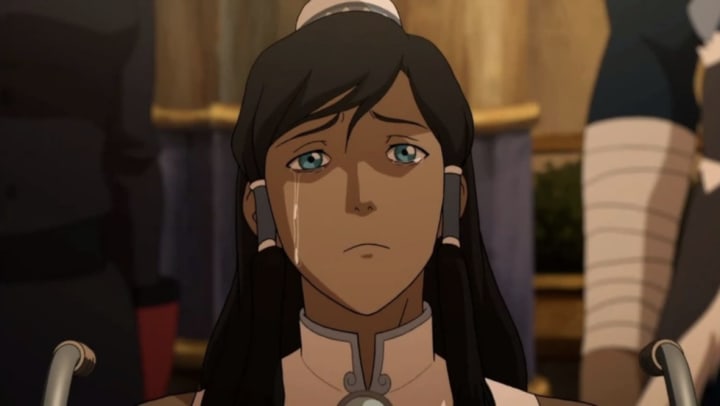
Do I really need to say anything else?
Book Four: Balance
It's been over eight years, and Korra's storyline surrounding trauma still bring me to tears. Poignant, well paced, and the focal point of easily the best episode in the whole show, "Korra Alone" is a memorable standout episode just as it was seven years ago. It is hands down the best episode of the entire show and one of the best episodes of either show's run.
However, the rest of the season does not — unfortunately — live up to this potential. There were a few things I remember picking up on even back when I used to get up early before school to watch LOK Book 4 as it aired weekly: too much Wu, too much Meelo, a bit of floundering pacing. But, overall, if you had asked me what I'd thought of Book Four at the time, I would have said it was close to being on par with Book Three. Two fantastic seasons, one that's pretty good, and one that's pretty bad, is a decent run for a Good show to have.
Rewatching Book Four, now, though, it becomes apparent that this season suffers from many of the same flaws as Book Two. Disconnected subplots, too many characters running around in different areas barely interacting or affecting each other (particularly true for Bolin, or Korra, who remains separated from everyone else in her circle for most of the season), leading to an overall distracted focus. Book Four manages better than Book Two largely because its villain and Korra's arc are more straight forward and interesting, with disparate subplots more successfully linked together, but it's still not the graceful pacing that allowed Book Three to easily be the best season of the show. The fact that so many of the characters, of Team Avatar in particular, are separated for so much of the season doesn't do the pacing any favours, either.
That said, what works, works. Korra's arc is particularly strong in the first half of the season, even if her mental health recovery is somewhat dropped in the second half. Wu's character arc is realistic, seeing everyone work together is fun, Toph is great, and Kuvira is an interesting and formidable foe with a unique bending style. I actually didn't mind the robot showdown, even if it dragged for a bit.
I also can't blame all of Book 4's pacing problems on the crew itself, as I know partway through production, Bryan and Mike were given the choice to either axe some of their team or cleave the animation budget, resulting in the clip show episode, and accordingly chose the latter. The clip show itself isn't terrible, with one of my favourite jokes in the whole show (the the entire villain phone call bit) and it's a good a recap as any while still very much being a clip show. However, this does mean they accordingly lost 20 minutes that the season could've easily put to good use to smooth things out and develop some things further, unfortunately.
All that being said... the ending scene of Korra and Asami holding each other's hand still makes me cry every single time.
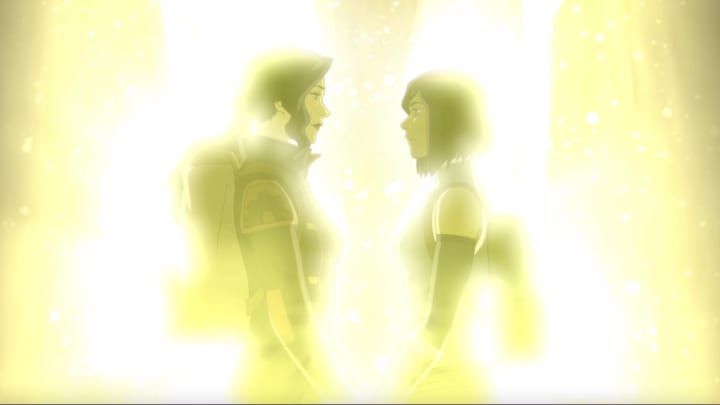
At the time the finale premiered on December 19th, 2014, I wouldn't start questioning my sexuality for another two years. I wouldn't realize I was queer for another two years after that. But I still remember being joyful, and amazed, that the long shot absolutely no one thought would happen - we all assumed Korra would either get back together with Mako, or be single - happened. And that sort of thing just didn't happen on kids' shows back in 2014, let alone with the lead character, let alone with two of them.
There was a happy sort of ache in my chest years later upon knowing that, even when I had realized I was queer, I would still be welcome in a world I'd loved since childhood. It's doubly precious to me now that that has hardly been the case with other properties I've loved, as a trans person.
That, and Korra's ending with her and Asami opened up the door to places I never thought I'd see in my lifetime, let alone less than ten years later, on shows like The Dragon Prince in particular.
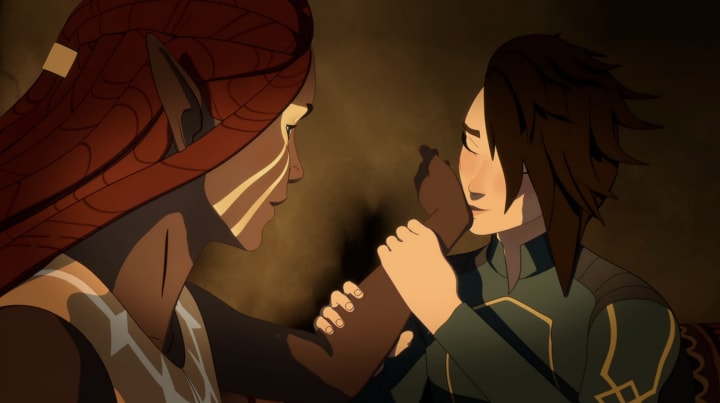
I'll always be grateful to it for that, and I don't think that'll ever change.
Conclusion
So where does all of this leave us? Well...
Much like its various elements and different conflicts each season, Legend of Korra is ultimately a mixed bag. What it does well, it does extremely well. Other aspects are more muddled, largely the pacing, a few of the romantic relationships, and a lack of continuity for the character arcs season from season for anyone outside of Korra, Tenzin, and most surprisingly Mako, who comes out with one of the most solid character arcs in the whole show. I'd probably give the show an overall 7/10 in general, if someone can make it past season two (I know I almost didn't).
That said, that's also based off my subjective preferences regarding strong character arcs spread across a main cast as well as in depth worldbuilding, both things ATLA had in spades. If you're more protagonist or action oriented, or just want more of Avatar's general world, I would definitely recommend Korra. But if you want something that feels undeniably like ATLA, I'd recommend going elsewhere. Nor do I think LOK wanted precisely to be like ATLA, either, but I do still think that overall LOK falters in areas that keeps it from being a Great scenes, and just enough great elements that allows it to be a good one, all thing considered.
About the Creator
TC13
Aspiring author and mythology enthusiast with a deep love for fantasy. Writes from a queer nb (they/them) perspective.




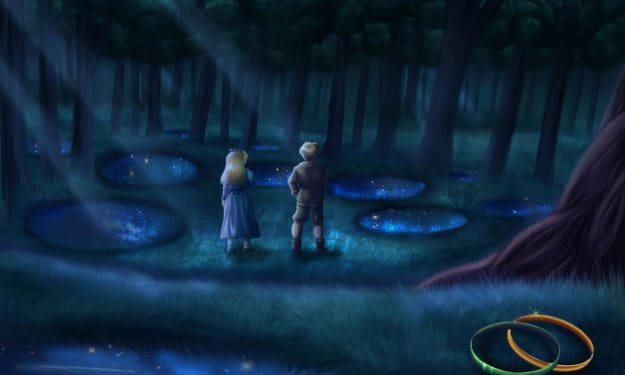

Comments
There are no comments for this story
Be the first to respond and start the conversation.